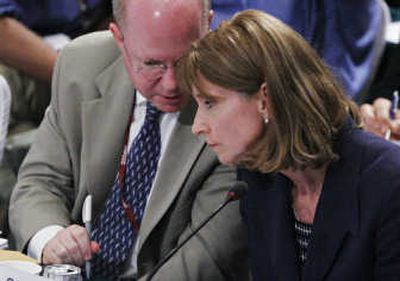Global warming pact makes key progress

NUSA DUA, Indonesia – The landmark global warming document agreed to Saturday by delegates at a United Nations climate conference here was weakened in last-minute negotiations but still made important progress in two key areas.
Under U.S. pressure, the document abandoned setting a firm goal for worldwide emissions reductions and left open the possibility that industrialized countries could avoid individual caps on their emissions.
Nonetheless, for the first time, it enrolled the developing world in efforts to reduce global emissions and pushed them to consider ways to limit their output of greenhouse gases as they bring their people into the industrial world.
More importantly, the agreement kept the United States – long considered the biggest roadblock in taking united action against global warming – at the negotiation table and offered hints that the country might be willing to join international efforts.
“At long last, the warnings from the world’s leading scientists are no longer being totally ignored by the Bush administration,” said Rep. Edward J. Markey, D-Mass., chairman of the House energy independence and global warming committee. “When every other world leader is calling for action, not even this administration can refuse to listen.”
The unanimous approval of the document by thousands of delegates meeting on the Indonesian island of Bali sets the “road map” for the next two years of negotiations to create a formal climate treaty to succeed the 1997 Kyoto Protocol, whose limits on polluters end in 2012. The next phase of talks is scheduled to begin in April and, ideally, conclude in Copenhagen in late 2009.
The document almost did not get completed.
A chief sticking point was the inclusion of tough emissions targets recommended by the U.N.’s Intergovernmental Panel on Climate Change in a series of reports issued this year and pushed hard by the European Union.
Working through the night Friday, negotiators reached a compromise that seemed to pave the way for acceptance of the document. The targets – which include a 25 percent to 40 percent reduction in emissions by industrialized countries by 2020 and a 50 percent reduction in overall emissions worldwide by 2050 – were eliminated from the text and replaced with a footnote referring to a broader range of options in the IPCC reports.
Some delegates called the compromise weak, but it was, at least, strong enough to win the Europeans’ support. The U.S. also seemed pleased.
But even the watered-down document ran into trouble when it reached the assembly floor Saturday morning for ratification, with India objecting that the draft did not require industrialized nations to help developing countries control their emissions with technology and funding.
That position reflected one of the central themes of developing nations at the meeting: that the United States and other wealthy countries had caused global warming with their profligate use of energy and now expected less-developed countries to curb their industrialization to prevent the problem from getting worse.
The assembly was suspended temporarily while delegates worked out alternate language to reflect the developing nations’ concerns.
U.S. delegate Paula Dobriansky said the United States could not accept the compromise language and argued that developing countries were not offering enough to curb their emissions.
The room erupted in a chorus of boos.
In a stunning reversal, Dobriansky backed down just moments later.
“The United States is very committed to this effort and just wants to really ensure that we all will act together,” she told the gathering.
But the U.S. delegation’s acceptance of the agreement is no guarantee of eventual approval. U.S. negotiators played a key role in writing the Kyoto Protocol, which called on industrialized countries to reduce their emissions to 5 percent below 1990 levels. But President Clinton refused to submit the agreement to the Senate for ratification when it became obvious it would be rejected.
Getting the developing countries on board also was difficult. China, whose total emissions may already exceed those of the U.S., and India, the world’s fourth-largest polluter, have long argued that rich countries created the problem but are now expecting poor countries to bear the brunt of cutbacks. Both countries were exempt under Kyoto from mandatory emissions reductions because of their developing status.
Getting their cooperation “is groundbreaking,” said Don Melnick, co-director of the Center for Environment, Economy and Society at Columbia University.